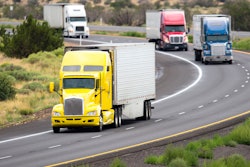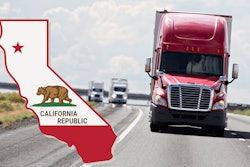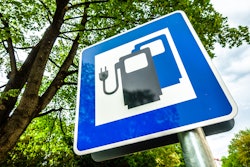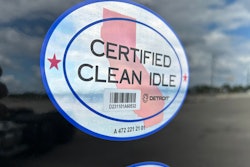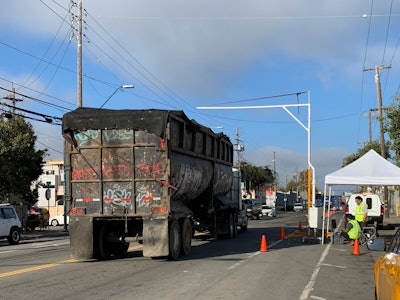
The California Air Resources Board's (CARB) authority to pass its own emissions standards over and above those passed by the Environmental Protection Agency is currently under fire from President Trump's administration.
Speaking on a panel Tuesday at the 2025 Technology & Maintenance Council Annual Meeting & Transportation Technology Exhibition in Nashville, Mike Tunnell, senior director of environmental affairs and research at American Trucking Associations, noted a modern diesel truck has seen a 99% reduction in NOx since 1973 and 99% in PM emissions since 1987.
Facing upwards of 11 different emissions regulations from both CARB and the EPA from 2021 to 2032, Alissa Recker, product regulatory affairs engineer at Daimler Truck North America, said this is the "most crowded and most uncertain regulatory landscape that we as OEMs have ever worked with."
The California Air Resources Board’s (CARB) Advanced Clean Truck (ACT) Regulation is designed to transition medium- and heavy-duty vehicles from diesel-based to zero-emission powertrains. Beginning with the 2024 engine model year, it requires 9% of Class 4-8 trucks sold to be zero-emission, with the total rising to 75% by model year 2035. Class 7 & 8 truck-tractors sold in model year 2024 will have to be 5% zero-emission-based rising to 40% by 2032. Five other states have signed on to the same ACT plan — Massachusetts, New Jersey, New York, Oregon and Washington — and as many as 10 more are in the process of joining first adopters.
ACT faces some uncertainly locally, said Nick Chiappe, director of government and regulatory affairs at California Trucking Association, as it was originally intended to work in conjunction with CARB's Advanced Clean Fleet (ACF) rule, which CARB abandoned at the end of the Biden administration.
"What this means now and what's going to happen is up in the air," Chiappe said, adding that California will continue its push in zero emissions policies. "We know for at least the next four years... CARB will not be able to receive any waiver" that requires fleets adopt zero emissions vehicles.
"What we've seen from CARB is they intend to enforce the state and local government fleet part of the rule," Recker said, but Chiappe added that for for-hire and private fleets, ACF "is not enforceable."
CARB has lauded ACT as successful to date citing that one in six medium- and heavy-duty trucks in the state are zero emissions. "The reason why... is because of the classification of Class 2b vehicles being included in that calculation," he added. "It's not really a clear and accurate representation" of heavy truck zero emission sales and demand in the state, Chiappe said, adding there are only about 300 heavy-duty zero emission trucks operating in California currently.
Chiappe noted there has been some "strain" on the ability to get zero emissions trucks, which would unlock more diesel units for sale, creating a standoff between the supply and demand that is supposed to drive rule enforcement and Recker noted that credits cannot be transferred from the truck category to the tractor category and those credits are state specific.
California’s Advanced Clean Fleet (ACF) initiative requires fleets that are well suited for electrification to reduce emissions by phasing in the use of Zero-Emission Vehicles (ZEVs) and requiring the exclusive manufacture of ZEV trucks starting in the 2036 model year. Additionally, the Clean Truck Check (CTC), implements a strategy that includes roadside emissions monitoring to screen for potential high-emitting vehicles, improved emissions testing procedures using on-board diagnostics data, and emissions checks and data reporting at required intervals.
CARB's CTC is the nation's first "smog check" with twice annual tailpipe checks on vehicles over 14,000 pounds. Testing increases to four times per year in 2028. Any vehicle entering California that hasn't applied for and received a five day exemption can be tested.
Violations are generally found during roadside checks and fleets are issued a "fix-it ticket," Chiappe said, and given a grace period to get the truck in complaince and retested. Those roadside checks, he added, do not have a 100% success rate, meaning fleets have to be proactive in either making repairs or filing appeals within 90 days.
"These [fines] are thousands of dollars," said Matt Devirgilis, Penske Truck Leasing, whose company operates more than 40,000 trucks in the state. "We've seen a few trucks fail the road check," but pass subsequent OBD checks. "And we've also seen new vehicles fail," he added. "The roadside is not a foolproof system."
Greg Colvin, senior director solutions engineering at Zonar Systems, noted that CTC also encompass older vehicles that don't support older vehicles that don't do data collection through the OBD port, and those vehicles – typically model years 2012 and older – will continue to face a smoke opacity test.
Trucking in every state faces new federal emissions mandates under the EPA's Greenhouse Gas Phase 3 for the 2027 model year. As part of these rules, the goal is to electrify 25% of new long-haul trucks by 2032, as well as upwards of 40% of new short-haul daycabs – "Pretty challenging ZEV requirements for manufacturers," Recker said.
"GHG 3 is going to bring a lot of engine changes for 2027," said Matt Devirgilis, Penske Truck Leasing, noted changes in the aftertreatment system and in turbocharger design and function. "There's a lot of training that's going to need to happen for anybody that has technicians."


